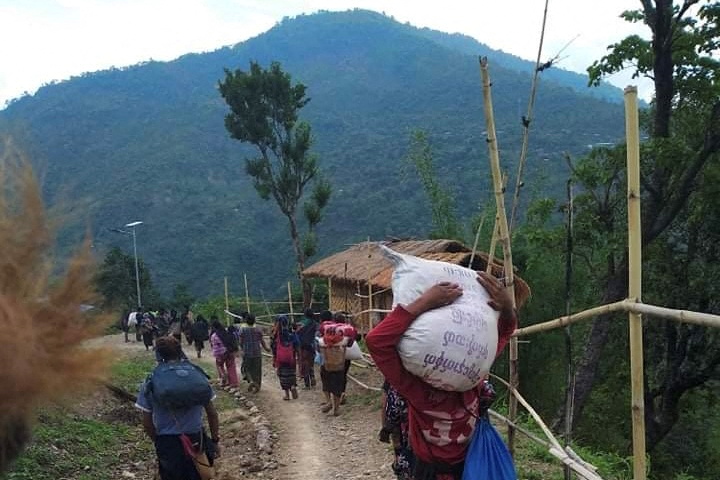Need for humanitarian aid in Myanmar expanding exponentially: UN envoy
Sign up now: Get insights on Asia's fast-moving developments

People displaced by fighting between the military and anti-junta fighters in Myanmar's Chin state on May 31, 2021.
PHOTO: REUTERS
WASHINGTON - With Myanmar's economy in a state of collapse and the country mired in political conflict, the need for humanitarian assistance is expanding exponentially, says Mr Thomas Andrews, the United Nations' (UN) special rapporteur on human rights in Myanmar.
And the international community has scope to do much more to pressure Myanmar's army, he said.
Mr Andrews, who is a senior human rights fellow at Yale University Law School and an associate of Harvard University's Asia Centre, told The Straits Times: "There is a deterioration of conditions in the country from just about any way you look at it and by any measure.
"The challenges of getting humanitarian aid where it needs to be are quite significant," added Mr Andrews, a former US Congress member from Maine.
Separately, a grim Jan 13 update from the UN's Office for the Coordination of Humanitarian Affairs noted that since December 2021, fighting between Myanmar's armed forces, ethnic armed organisations and the local people's defence forces has intensified in Kayah and Kayin states.
Since May 2021, 181,400 people have been "newly displaced" just across the south-east of the country alone, it said. Overall, more than 200,000 people have been displaced.
Earlier in January, six civilians were killed in military air strikes in Kayah state that sent thousands fleeing for safety. The dead included two children, reports said.
Mr Andrews, who the regime has not allowed into Myanmar, said that the military has lost all legitimacy.
"They're obviously one of the largest militaries in the region, they have access to very sophisticated weapons; and they've shown that they have no scruples whatsoever in terms of their use, (and) their brutality," he said.
"But the bottom line is that it's not going to work because that's all they have. They have no legitimacy in the country. The opposition is overwhelming. It is broad, it is deep, it is multi-generational."
He said it is almost as if Myanmar is under military occupation.
"And as in any military occupation, their so-called strength is their weaponry and the size of the military. But it's also a vulnerability.
"It takes money to maintain a large military. It takes weapons. And there are limits to the sustainability of maintaining that kind of a military force in the light of the fact that they are so deeply unpopular in the country."
Anecdotal evidence indicated defections and fewer takers for slots in the military's academy, Mr Andrews said.
If the international community would take seriously the June 18 non-binding resolution calling for countries to stop the flow of weapons, and if sanctions could be stronger, more focused and coordinated, "there is real vulnerability on the part of this military", he added.


